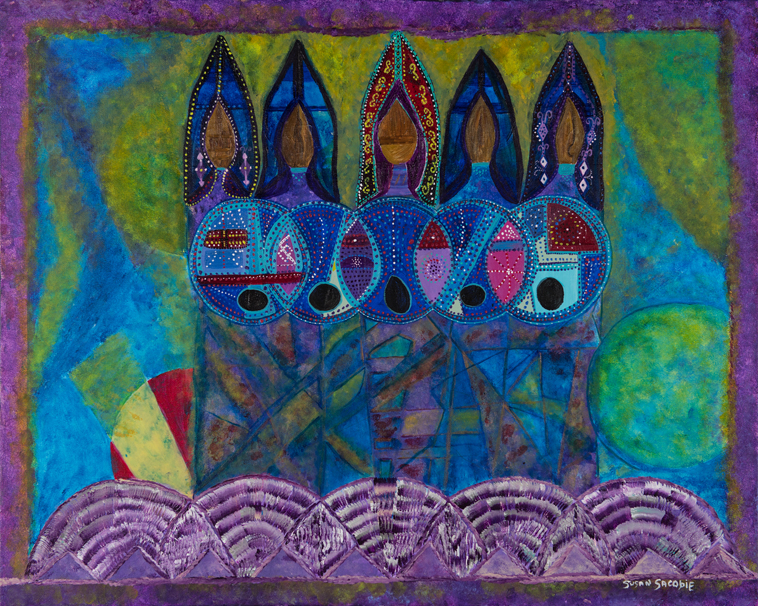Celebrating change-makers on International Women’s Day
Photo: © Josie Desmarais. People march through the streets of Montreal on October 4, 2016, to mourn missing and murdered Indigenous women, and to raise awareness about violence against Indigenous peoples.
Chief Wendy Wetteland, president of the New Brunswick Aboriginal Peoples Council, approached University of New Brunswick, law professor Jula Hughes in 2015 for help on a research project. It would look for ways to prevent victimization, and improve outcomes for missing Indigenous women, girls and sexual and gender minorities in Eastern Canada.
The resulting collaboration is the type of work being honoured through the United Nations’ theme for International Women’s Day 2018: “Time is Now: Rural and urban activists transforming women’s lives.” It celebrates people around the world who are mobilizing to create a more equal future.
In Canada, Indigenous women make up only four per cent of the female population. But today they are 12 times more likely to be missing or murdered than any other women. Status of Women Canada further estimates that Indigenous women and girls in Canada are disproportionately affected by all forms of violence.

“This painting is for the missing and murdered Maliseet and Mi’kmak women that were almost forgotten. The five women in this piece represent knowledge, faith, wisdom, justice and peace. They are wearing our traditional peaked hats decorated with the double curve motifs. The wampum belt on the bottom is our promise to each woman that their lives will be remembered, celebrated, honoured. The wampum belt is also a promise to each Native woman that we have to rebuild our matriarchal standing within each of our families and communities. We must humble ourselves and learn and teach one another about who we are, where we come from and to not be silent and share our individual stories so we can empower our sisters, stay connected and strong and in turn we keep our families and communities strong. Their connecting shields are protecting us and reminding each of us that it is an obligation and a privilege to guard one another because we are all connected. As mothers and daughters, the living as well as the women who crossed the rainbow bridge, we have to tell ourselves and each other our lives matter, we are important and we have to love and respect each other unconditionally and stand together.”
—Susan Sacobie
Wetteland and Hughes have created the “Looking out for each other: Assisting Aboriginal families and communities when an Aboriginal woman goes missing” project to help.
“I am confident that the project will empower families and friends of missing persons to take effective action,” says Hughes.
The project’s community-driven, collaborative research initiatives combine university-based research, Indigenous self-governance organizations, social justice efforts, and justice system reform.
The resulting networks of Indigenous women leaders and researchers from across Eastern Canada, organized into academic and advisory circles, bring community knowledge together with academic research capacity.
The team first consulted with community partners to identify urban Indigenous organizations’ existing capacities, and what future resources could address community needs. Among other options, the community identified the need for a helpline for family members and friends, to advise on issues like interactions with police and media, and the use of social media.
The project team is also working on other tools, resources and research to help support Indigenous women and their communities.
They are developing a resource manual for Indigenous organizations to help families and friends of missing Indigenous persons navigate the complicated mainstream service systems they have to deal with.
Law student Fahim Rahman is exploring agency services that could increase access to justice in the province. These include municipal, provincial and federal police services; and legal assistance, health, public safety, crisis response, and search and rescue services.
The project is also bringing forgotten and undocumented stories to light by tracking and recording the cases of missing women, and uncovering how services worked or failed to support their families and friends.
The team’s research co-ordinator, Janelle Marchand, is exploring the mental health support available for Indigenous service providers, while other team members are exploring cultural safety training and improved risk assessment practices for police forces, and lawyers’ training and development in cultural competency.
On March 13, the University of New Brunswick will appoint Jula Hughes as a University Research Scholar for her consistently high level of scholarship, and whose research is, or has the potential to be, of international stature.
Project partners
Indigenous community partner organizations include Native Councils, Friendship Centres, women’s organizations and Transition Houses in Eastern Canada. The academic partners are: Professors Mirja Trilsch, Doris Farget and Dominique Bernier (UQAM); Laurel Lewey (St. Thomas); Naiomi Metallic (Dalhousie); Catherine Martin (Mount Saint Vincent); and Jennifer Shea (Memorial).